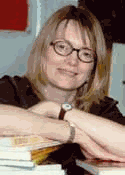2006 Oration
The Crimson Thread: What unites Australians today?
The 4th Henry Parkes Oration: Associate Professor Helen Irving
28 October 2006. Parkes Shire Council, Parkes NSW
Download the full text as a PDF.
The Coventry Room at Parkes Shire Council was the venue for the fourth annual Henry Parkes Oration, delivered by Dr Helen Irving, the distinguished author and constitutional law expert.
Dr Irving had just returned from a year in the United States where she held the Harvard Chair of Australian Studies, to a position as Associate Professor in Law at Sydney University. She is the author of a number of books and many papers relating to the Australian constitution and social issues, most recently Five Things to Know About the Australian Constitution. Dr Irving has an affinity with country Australia and with Parkes, having grown up in rural Victoria, and having been the Parkes Shire Australia Day Ambassador in 1999.
Six students from the Sir Henry Parkes Primary School provided a fascinating prelude to the oration when they presented their research on social issues to the gathering, before travelling to Sydney for the Primary School Citizenship Convention the following Monday. Dr Irving was then introduced by the former Federal minister and Australian High Commissioner in London, Dr Neal Blewett who himself had delivered the second Parkes Oration.
Dr Irving’s address took as its starting point Henry Parkes’ vision for a united Australia and his statement “The crimson thread of kinship runs through us all.”
“What bound all Australians together, Parkes believed, was both a common origin and common vision of a future Australian nation. The British heritage would be built upon, developed and Australianised.”
She then explored the concept of Australian identity, and what it means today. “… the Australian identity is not a physical or an ethnic identity, but a bundle of characteristics – we can share these, and still be very different from each other in many other ways, like members of families often are.”
